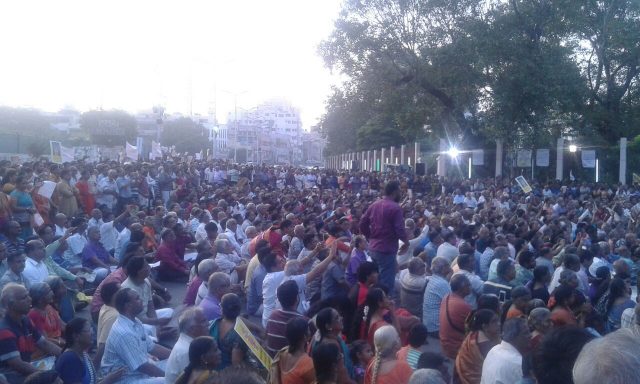
In the recent past, Tamil Nadu had witnessed a resurgence of venomous attacks on Hindu beliefs and religious symbols and icons. Much has been written on the crass insults that Victor James Vairamuthu, a Christian, heaped on Andal Nachiyar, the goddess revered by Hindus all over the world. As if this were was not enough, Kanimozhi, the self-acclaimed atheist Rajya Sabha member and daughter of M. Karunanidhi of the Dravida Munnetra Kazhagam (DMK), also made uncharitable remarks about Lord Venkateswara of Tirupathi.
The insults came during Dhanurmasa, the period of the year that Hindus consider most auspicious for reciting Andal’s Thiruppavai – a collection of thirty stanzas (paasurams) written in Tamil by Andal in praise of Lord Vishnu. The timing of these insults was carefully designed to create maximum hurt to the Hindus. It certainly did.
It is not that the insults of Victor James Vairamuthu or Kanimozhi by themselves have stirred up the strong Hindu rising. It has certainly proved to be the hot trigger for a huge swathe of the population that has been reeling under constant anti-Hindu harangue and endless taunts.
Unlike in the past, this time around, these anti-Hindu claptraps had the shock of their lives. Hindus from all over south India – Tamil Nadu, Andhra, Telangana and Karnataka – expressed their anger and took to the streets to protest the insults. The spontaneity and widespread protests, particularly by women and younger generation, pleasantly surprised even the protesters themselves.
In the initial days, the protests were largely ignored by the mainstream media, particularly the television networks in Tamil Nadu. However, the extensive use of social media – particularly Facebook and WhatsApp – proved to be a game changer. It was the active and angry presence in the social media that forced the television networks to devote time. This only fueled the spread of anger to every household and only spawned even more protests.
Housewives took to posting angry self-made videos expressing their disgust at Vairamuthu and seeking his unconditional apology. Many exponents of religious discourses were also at the forefront addressing gatherings of angry Hindus. In fact youngsters – sub-30s something and women in particular – dominated the protest marches. In major urban and metropolitan areas, many retirees and elderly people also joined the protests.
At a time when the entire political class has shunned speaking out in public on the Vairamuthu fiasco, H Raja of the BJP and TTV Dinakaran of the breakaway AIADMK have been the two lone voices that have unequivocally condemned it. H Raja has not only castigated the Dravidian parties but has also been at the forefront of the protests. Despite the negative portrayal by the mainstream media, he seems to have gathered huge grassroots support across the state, particularly among the young people in Tamil Nadu.
Contrary to what the television networks have portrayed, the protests were well spread out and saw the participation of all communities across the Hindu faith. However, it is true that the crowds that were seen on the streets were not as large as would be seen in a popular political rally. But the diverse, spontaneous gatherings have sent an ominous message writ too large to ignore.
It must however be mentioned here that it would be perfectly legitimate to have differences and disagreements with Hinduism per se, its philosophies, its sacred texts or its belief systems. Hinduism itself has a well-established tradition of debating such differences. Hence the proper and acceptable forum to address such disquiet would be to invite both sides to debate publicly so the people can draw their own conclusions.
Insulting Hindu religious figure heads, on the contrary, has no room in a civil society and is a clear infringement of constitutional guarantees for religious freedom. It is a naked attempt to incite hatred that has the potential to spiral into religious violence and hence is a threat to law and order. It is time to read the riot act to Vincent James Vairamuthu. But unfortunately an effete government in the state has not shown the courage to act. Inaction will certainly not be forgiven by the people in the elections.
The Dravidian cults in all their hues and avatars are no more than a band of Hindu-baiting political opportunists who have unscrupulously played the pseudo secular card for several decades now. As many researchers and authors have already pointed out in their well-documented studies, these cults are but executing their alien masters’ bidding. It is obvious that these forces are tightly aligned with those who do not wish India well.
Despite their protestations and false propaganda to social reforms, the number of Hindus worshiping at the temples continues to swell and unbelievable numbers visit the temples every day. This stands as a grand testimony to the unshakable faith of the Hindus of Tamil Nadu. But to poke this huge mass of humanity is tantamount to committing political hara-kiri.
The obvious result, over the years, has been the creation of a large cesspool of latent anger and hurt among large sections of Hindus that has refused to drain or dry away. The insults heaped on goddess Andal Nachiyar and the sham regrets by Vincent James Vairamuthu and others of his ilk has definitely ignited this latent anger. The rancor and vitriol have only succeeded in passing the unmitigated hatred for these bogus cults from one generation to another.
This is an unmistakably a red flag for the Hindu-hating Dravidian political tribes and could well be a harbinger of upcoming jet steam of political changes just round the corner in Tamil Nadu. It has the potential to blow the Dravidian cults to irrelevance and decimate them from the political scene once and for all.
By Naagesh Padmanaban
Courtesy: Vijayvaani














